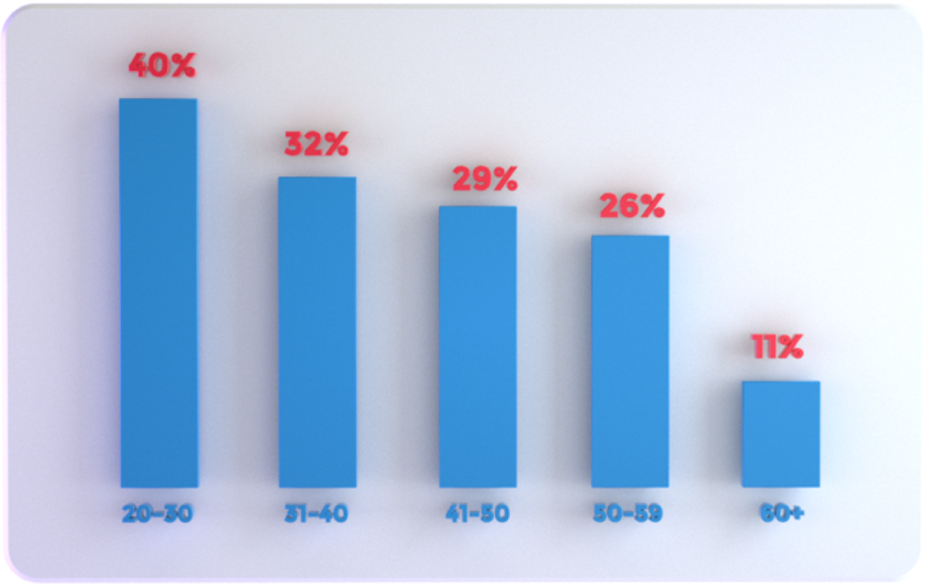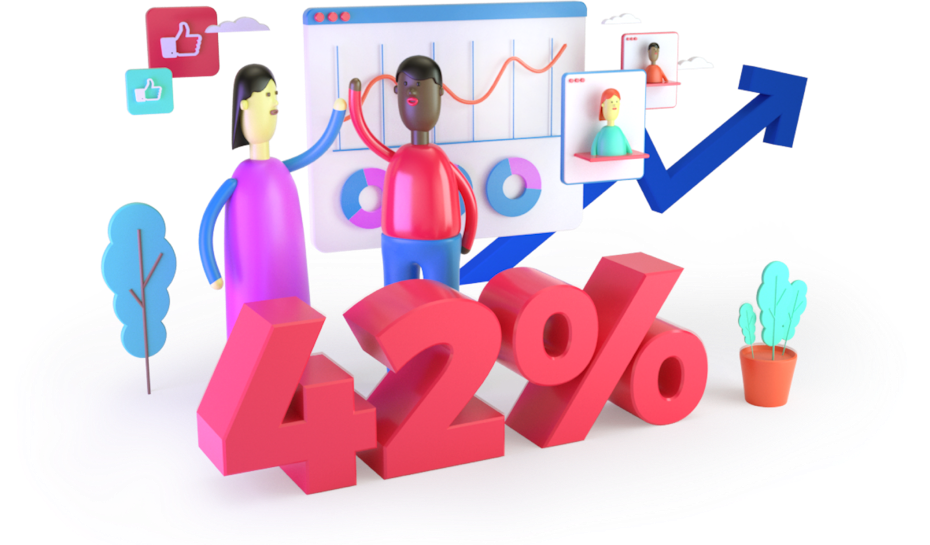If you’d told us this time last year that we’d be soon be locked in our houses, running entirely remote teams and creative processes, navigating some of the most significant social crises in living memory, and having meetings with the CEO whilst wearing our slippers, we’d have asked what you were planning to call this fantastic work of fiction.

Nobody could have predicted what has unfolded in 2020 – and it’s not over yet.
Pandemic. Social injustice. Civil unrest. A climate crisis.
The list of challenges is as exhaustive as it is exhausting, and in both a personal and professional capacity, this year has tested every marketer and brand manager on the planet.
Our design community works with marketers from all over the world on a daily basis, and as these changes unfolded we wanted to understand the highs, the lows and the learnings of the past six months within this group. Agency, client-side and freelance, we spoke to C-suite executives, Marketing Leads, Account Managers and Brand Directors from around the world to establish how the events of 2020 have shaped the industry so far.
A challenging year, with silver linings
—
While the marketing industry has been moving slowly towards more flexible working arrangements for a while now, almost three quarters (74%) of marketers have been working from home since March.
The impact of such a rapid and fundamental shift in work model is far reaching, as are the effects of 2020’s many social and economic challenges.
But even through adversity we are already seeing benefits emerge that have the potential to shape the growth of the marketing industry in a positive way for years to come. Key takeaways include:
- Account Managers and Brand Managers are almost twice as likely to have experienced improved productivity levels than their senior leaders when working remotely
- Younger marketers have found remote creative collaboration significantly more challenging than their older colleagues
- 1 in 5 marketers believe opportunity for career advancement has actually improved during the pandemic
- 42% of managers believe that communication with their team has improved while working remotely
- Working from home has normalized remote work, and the majority of marketers say this will affect their hiring plans moving forward
- Agency staff are much more keen to get back to the office than their in-house counterparts
- Many marketing professionals under 35 believe remote training and onboarding will have a positive impact on the industry – as do 40% of agency staff
- A quarter of agencies expect fixed retainers to disappear altogether with a significant increase in demand for project-based work
- Direct mail and out-of-home are the channels marketers expect to die out in a post pandemic world, but there’s already some growth in paid social activity, digital advertising and podcast sponsorship
- Unveiling a rebrand during a pandemic is a risky move, with 37% of marketers expecting it to have no impact at all
- The majority of marketing professionals are confident that their own brand will take (or has already taken) meaningful action following anti-racism pledges, but they are much less confident that other brands will follow through on their promises

Productivity in a remote setting
—
Surely working from home makes us all more productive? There’s less distraction from the fancy coffee machine, no need to tend to the office plants, and no chatting with your desk mates.
Well, yes and no. It’s definitely not one size fits all.
Almost a third (32%) of marketers said their productivity improved working from home, while just under a quarter (23%) said their productivity had taken a nosedive. Everyone else said their levels remained about the same.
But when you look more closely at the specific roles of marketers and how their productivity has been affected, there’s more to these figures than meets the eye.
Almost 2 in 5 (38%) Account Managers and Directors and 44% of Brand and Marketing Managers said their productivity had improved while working from home. On the other hand, half of C-Suite and Agency Owners said their productivity levels had stayed the same, with only 25% reporting an improvement.
The do-ers seem to do better remotely while senior leaders have maintained similar levels of productivity compared to their more junior colleagues. While experience means more senior team members have likely refined their working style and already found a balance that works for them, the type of work could well play a role.
In short, executional, hands on work has the opportunity to thrive in times of increased focus and decreased interruptions (pets and children notwithstanding!).
Creativity and collaboration
—
A similar split can be seen when it comes to creativity.
30% of all marketing professionals said that they found creative work and collaboration on creative projects more difficult since working from home, but a similar number (31%) said they actually found it easier remotely.
However, when you look at the breakdown of responses by age (and therefore typical levels of seniority), a pattern emerges: younger people have found remote creative collaboration more challenging than their older colleagues.

Again, this can perhaps be explained by experience and tenure: effective collaboration is often underpinned by effective communication – both of which are skills that can be developed over time. The confidence that comes with experience is also significant when it comes to decision making and accountability in a remote setting.
However, how the type of work being done affects creative collaboration shouldn’t be ignored if remote work is truly going to be the world’s new normal.
Career changes and opportunities
—
Marketing budgets are often the first to be cut when belts start tightening (despite a lot of evidence showing it shouldn’t be). As such, layoffs and furloughs hit the marketing industry hard when the pandemic took hold in March.
But several opportunities have emerged, and there are some silver linings that will serve the industry well moving forward.
Reduced teams and shared experiences of enduring challenging times together has meant people have had to rely on each other a lot more than normal – both professionally and personally. As a result, almost a third of marketers (31%) now believe their managers have a greater trust in their abilities than before the pandemic began.
With many marketing professionals taking on extra responsibilities and workloads over the past six months, 22% also believe that the opportunity for career advancement has actually improved during the pandemic.

Communication and teamwork
—
With the majority of the industry now working remotely, phone calls, video calls and instant messaging tools quickly became necessities for communication and collaboration. 37% also said that the number of meetings they attend has increased since working from home.
However, despite initial worries that not being sat next to each other would hinder quick and effective communication, many marketers have actually found significant benefits in working in a distributed team. In fact, 42% of managers believe that communication with their direct reports and team has actually improved during the pandemic.
The future is remote, long live the freelancer!
—
While the shift towards flexible work has been happening in the background for some time, the pandemic is set to have a lasting impact on how brands and agencies engage with staff both in and out of the office.
The majority of respondents (57%) said that they expected their company or clients to bring in more remote-only talent as a direct result of the normalization of working from home during the pandemic.
Over two fifths (42%) expect their companies to hire full time remote employees and almost a third (31%) anticipate working with more remote freelancers moving forward. The opportunity here is clear: as the industry becomes more comfortable working with remote talent, brands and agencies will be able to hire more diversely, benefitting both companies and clients alike.
Back to the office
—
In March, almost overnight, offices across the world emptied. And almost a quarter of marketing professionals would like to keep it this way forever.
Even so, 42% would like to return to the office full time, while a third would prefer the best of both worlds, combining some days in the office with some time working from home.
Agency staff in particular seem to be craving some company, with 56% wanting to return to the office full time compared to just 38% of in-house staff.
Around a quarter (24%) of all marketers also point out there are certain types of work they’re simply unable to do outside of the studio or office, which could explain the enthusiasm to get back to it.

The impact of remote training and development
—
The first few years of your career are crucial for developing skills and forming a working style. This traditionally requires on-the-job learning and observation of others, so it’s no surprise that 84% of marketers said that being close to their team and manager was important when they were starting out.
So how will remote work impact younger marketers just beginning their professional journeys?
We asked marketing professionals what they thought the effects of remote training would be, and somewhat surprisingly, more believe that remote training will have a positive impact (31%) than negative (24%).
The most common positive benefits of remote training and onboarding were highlighted as:
- Remote training allows for more focused 1:1 attention (33%)
- It puts everyone on the same level communication-wise (29%)
- Being able to train people remotely enables their business to hire more diversely (26%)
The top challenges flagged by those who believe the impact of remote training will be negative include:
- They don’t think they can replicate on-the-job training effectively in a remote setting (40%)
- In-person training is necessary for the roles they hire for (23%)
- Being together in an office is critical for company culture (17%)
There were also some fascinating differences of opinion by generations and organization type:
- Younger marketers believe remote training will prove beneficial, with 41% under 35 predicting a positive impact compared to just 26% of those over 35
- Similarly, 40% of agency staff anticipate positive effects from remote training, compared to just 25% of in-house marketers
While time will tell if this optimism around remote onboarding and training transforms into a lived reality for those embarking on their marketing careers, in many ways the benefits are clear: more focussed attention, a more equal platform for meritocracy, and opportunities for diversity – something the industry is sorely lacking.
Shifts in agency relationships
—
For many reasons, 2020 has also changed the nature of many client/agency relationships.
18% of marketers said they expect fixed retainers to become obsolete in a post-COVID world, while 39% expect there to be much higher demand for project-based work over monthly retainers.
Agencies themselves are less optimistic than their in-house counterparts about the future of the traditional business model. A quarter of agencies anticipate retainers disappearing altogether whereas only 14% of in-house marketers agree.
With so much uncertainty still remaining across so many industries, it’s not surprising that marketers expect the demand for greater flexibility and scalable teams for specific projects to increase in the future.

Impacts on channels and spend
—
An enormous number of brands and businesses have experienced a downturn this year, and as such 37% of marketing professionals reported their media budgets being cut.
Spend was reduced across the board, covering everything from social spend and ads across newspaper, magazine and TV. Unsurprisingly, our increasingly digital existence means that out-of-home and direct mail are the channels marketing professionals expect to dramatically decrease in importance in a post-pandemic world.
However, as we learn to live with COVID-19, many channels are expected to recover and grow – particularly paid social activity, digital advertising more broadly, and podcast sponsorship.
Rebranding in a pandemic
—
When asked whether rebranding in a pandemic was a smart move, marketers had mixed opinions.
49% believed a rebrand (even during a global crisis) would have a positive impact, while only 14% said it was likely to have a negative effect.
However, 37% thought that rebranding now would have absolutely no impact at all – which isn’t ideal for a brand looking to evolve its identity and unveil what will have been months, and potentially years of work. But that is exactly what Office 365, Cadbury, even Australia did – with very mixed results!
Brand activism
—
Alongside the challenges of the pandemic, 2020 was the year the world finally stood up and took notice of the Black Lives Matter movement following the tragic and untimely death of George Floyd.
Protests demanding social justice and an end to racism prompted many brands around the globe to state their solidarity with the cause and speak up on their commitment to fighting racial inequality.
While brand activism can play an important role in raising awareness and amplifying the voices of those who need to be heard, many marketing professionals are concerned that brands are making empty platitudes, with half (49%) of those surveyed believing that the majority brands will not follow their anti-racism pledges with meaningful action.
When it came to their own organizations though, they were slightly more optimistic. 39% of marketers said their company had released a statement or creative work supporting anti-racism in recent months, and 62% of them were confident that there would be real action taken as a result. Only 14% felt that there would not, but there’s clearly still work to be done.
No one was prepared for the amount of change society has endured both personally and professionally over the last six months. While much remains uncertain about the future of what the industry will look like beyond 2020, the silver lining is that marketing professionals and their teams have proven much more resilient and adaptable than we ever imagined.
Want to learn about how we came up with a solution to ease the corporate crisis?
99designs Select will solve your daily design challenges.
—
Methodology:
772 responses from marketing professionals collected online via market research platform Corus in August 2020. Responses were collected from the United States (528), Australia (145) and Germany (101). 37% are currently working in an agency, 36% are employed by a brand in-house and 27% are currently freelancing.
The post How crisis shapes creativity: marketing in 2020 and beyond appeared first on 99designs.
No comments:
Post a Comment